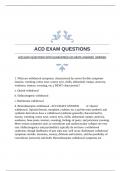ACD EXAM QUESTIONS
ACD EXAM QUESTIONS WITH GUARANTEED ACCURATE ANSWERS |VERIFIED
1. What are withdrawal symptoms, characterized by severe flu-like symptoms
(nausea, vomiting, runny nose, watery eyes, chills, abdominal cramps, anorexia,
weakness, tremors, sweating, etc.), MOST characteristic?
a. Opioid withdrawal
b. Hallucinogenic withdrawal
c. Barbiturate withdrawal
d. Benzodiazepine withdrawal - ACCURATE ANSWER✅✅A: Opioid
withdrawal. Opioids (heroin, morphine, codeine, etc.) and the semi-synthetic and
synthetic derivatives have a withdrawal syndrome generally characterized by
nausea, vomiting, runny nose, watery eyes, chills, abdominal cramps, anorexia,
weakness, bone pains, tremors, sweating, feelings of panic, and persistent yawning.
More serious symptoms such as convulsions and cardiovascular collapse are very
rare. Hallucinogenics and psychedelics typically do not have a withdrawal
syndrome, though flashbacks of past trips may well occur. Barbiturate withdrawal
symptoms include: insomnia, anxiety, delirium and tremors, and the possibility of
convulsions (seizures) and death. Benzodiazepine withdrawal symptoms are
,similar to those of barbiturate withdrawal but potentially at least somewhat less
severe.
2. Genetic factors make up roughly what proportion of the risk for addiction?
a. Less than one-tenth
b. One-quarter
c. One-half
d. Three-quarters - ACCURATE ANSWER✅✅C: One-half. Studies reveal that
major factors in drug abuse vulnerability include social, family, culture, and other
factors. However, epidemiological studies reveal that genetic factors contribute as
much as half of an individual's risk for drug abuse. The role of genetics is slightly
higher for males than females, and the role of genetics in heroin abuse exceeds that
of any other drug. Further, the greater and more severe the manifestation of drug
abuse, the more predominant the role of genetics in the predisposition for
substance abuse. Theorists suggest a malfunction in neurotransmitter production
results in a potentially profound need to self-medicate to compensate.
3. What is the adolescent tendency to impulsivity and risk taking due to primarily?
a. Poor parenting
b. Prior abuse
c. Neurological immaturity
d. Influences of puberty - ACCURATE ANSWER✅✅C: Neurological
immaturity. There are numerous factors that contribute to the tendency of
adolescents to impulsiveness, unruly behavior, and risk taking. These include
limited life experience, high energy, a concomitant desire for external stimuli and
engagement, a predisposition toward peer influences, and so on. Of primary
influence, however, is the issue of neurological immaturity. Key portions of the
brain that manage judgment and emotional control are among the last to mature.
The prefrontal cortex, where impulse control, reasoning, and foresight are
managed, does not mature until early adulthood. Further, the adolescent brain
, appears to be more receptive to the effects of substances of abuse as well as more
vulnerable to subsequent physiological consequences.
4. What are depressant drugs (e.g., alcohol, opiates, barbiturates, and
benzodiazepines) typically used to cope with?
a. Excitement
b. Fatigue
c. Stress
d. Boredom - ACCURATE ANSWER✅✅C: Stress. Depressant drugs reduce
levels of stress-related neurotransmitters and inhibit stress-accelerating hormones
(e.g., adrenalin and cortisol). This is accomplished, in part, by mimicking the
body's three natural stress-reducing analgesics known as endorphins (a contraction
of the term endogenous morphine). Lacking symptoms of stress, depressant
abusers such as heroin users may use the drug infrequently for years without
developing an addiction. Should significant stress arise, however, the abuse of
depressant drugs becomes highly likely. It is further theorized that addiction
potential is enhanced where biological factors may make stress susceptibility
greater.
5. Past which point is benzodiazepine treatment of anxiety NOT effective?
a. Six weeks
b. Four months
c. One year
d. Eighteen months - ACCURATE ANSWER✅✅B: Four months.
Benzodiazepine tolerance develops fairly rapidly. Consequently, anxiety cannot be
treated effectively beyond four months, regardless of the dosage. Polydrug use is
particularly problematic as using benzodiazepines in conjunction with pain
medications, alcohol, and antihistamines can produce severe respiratory depression
and even death. In the United States, the second-leading cause of drug-related
emergency department admission is benzodiazepine overdose. Due to the
development of tolerance, even after use for as little as two to three weeks,




